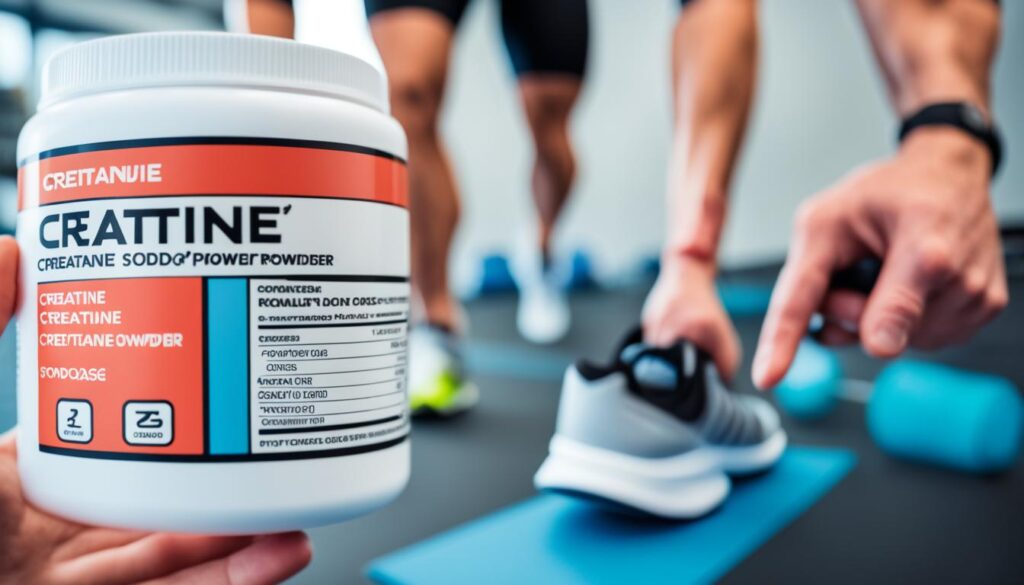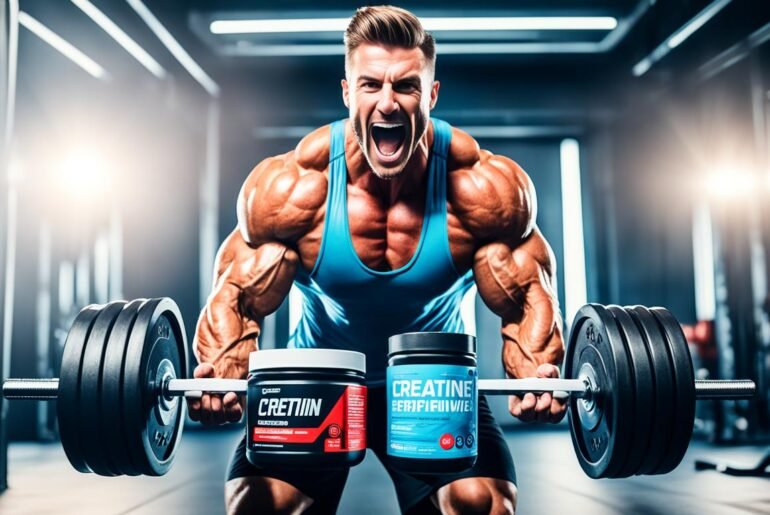When we think of the supplements that fuel endurance athletes, the typical roster features the likes of carbohydrates and electrolytes. Yet, a surprising player is emerging on the field of endurance performance improvement: creatine. Despite its prevalent use in strength sports, creatine boasts a little-known fact—I’ve found that it may enhance not just muscular power, but also endurance capacity and thus is redefining the strategies in endurance sports.
Gone are the days when creatine was the exclusive ally of weightlifters. I’ve observed keen interest and research underscoring that creatine is essential for muscle contraction and that when coupled with training, it amplifies phosphocreatine levels more effectively than exercise alone. Noteworthy is the discovery that lower doses, such as 6 grams daily, can elevate aerobic endurance performance—positing itself as a significant adjunct for not just strength but also endurance athletes.
Key Takeaways on Creatine for Endurance Performance
- As a journalist covering the intersection of science and sports, my insights reveal creatine’s potential in acute endurance power enhancement.
- Creatine provides an accessible source of energy, proving especially beneficial for those in the earlier stages of endurance training.
- The positive impact of creatine on interval power performance introduces a new edge for endurance athletes.
- It’s fascinating that creatine does this without adversely impacting cardiovascular health or the body’s inherent endurance ability.
- I’ve noted that the benefits of creatine extend beyond the gym, allowing endurance athletes to push harder and recover faster.
The Science of Creatine in Muscle Function
When we look into the nitty-gritty of creatine and its profound impact on exercise physiology, it’s clear to see why it’s highly regarded in the realm of sports nutrition. My training regimen, like that of many other athletes seeking increased muscle strength and enhanced anaerobic capacity, often incorporates this powerful supplement. Understanding the science behind how creatine aids in ATP production enhancement provides a fascinating insight into its role in maximizing athletic performance.
Understanding Creatine’s Role in Energy Production
As someone who constantly aims to push the limits of my physical capabilities, I appreciate how my muscles’ demand for quick energy is met by the pivotal role of creatine. Creatine’s critical job is to replenish adenosine triphosphate, better known as ATP, which serves as the immediate source of energy during explosive movements and intense training bouts. This part of energy metabolism is essential for short, sharp bursts of power and sustained efforts over time periods ranging from a few seconds to around two minutes.
A Look at Creatine Phosphate and ATP Synthesis
Here lies the crux of creatine’s importance – creatine phosphate (CrP). Acting as a rapidly mobilizable reserve of high-energy phosphates in muscle cells, CrP donates a phosphate group to ADP to regenerate ATP. This mode of action ensures that I maintain optimal performance during my training, especially during high-intensity activities like sprinting or heavy lifting that rely heavily on ATP. Interestingly, the availability of creatine phosphate correlates with the muscles’ ability to perform high-intensity work before fatigue sets in, which is a game-changer for athletes across various disciplines.
| Training Type | Energy Source | Role of Creatine |
|---|---|---|
| Short-duration/high-intensity | ATP-Creatine Phosphate System | Rapid energy replenishment |
| Middle-distance running | Glycolysis and Oxidative Phosphorylation | Enhancement of ATP resynthesis |
| Strength training | ATP-Creatine Phosphate System | Increased muscle strength and endurance |
Combining my hands-on training experiences with these scientific insights, it becomes evident that sufficient creatine levels are instrumental in ensuring peak muscle performance for athletes. Including this compound within a well-thought-out nutritional strategy can help in realizing not just temporary, immediate performance gains but potentially long-lasting advancements in athletic prowess.
Enhancing Short-Term Performance in Endurance Sports

As a competitive triathlete, I’ve experienced first-hand the critical moments in a race where increased power output and reduced fatigue can make all the difference. The introduction of creatine supplementation into my regimen has proven to be a game-changer. By bolstering phosphocreatine stores, creatine directly amplifies my body’s capacity to rapidly generate ATP, the essential molecule for energy transfer within the muscles. This bioenergetic upgrade translates into tangible gains in my performance, particularly in the context of high-intensity bursts that are often decisive in endurance competitions.
Empirical findings support this personal experience, indicating that athletes utilizing creatine witness a demonstrable boost in short-term exploits, such as sprints within a cycling stage. This edge is attributed to an athlete’s enhanced ability to sustain higher training intensities without succumbing to early fatigue. Below is a comprehensive breakdown of the impacts creatine has on short-term performance indicators:
| Performance Indicator | Impact of Creatine Supplementation |
|---|---|
| Immediate power output | Significantly increased, allowing for powerful sprints and surges |
| Onset of fatigue | Delayed, enabling extended periods of high-intensity effort |
| Recovery between intervals | Enhanced, resulting in improved performance in subsequent bursts |
| Muscular endurance | May experience marginal improvements, aiding in overall performance |
Incorporating creatine into my dietary plan has been seamless and profoundly impactful. I align with research that not only champions its short-term benefits but also underscores the minimal risk profile associated with its use. Hence, for athletes aspiring to elevate their competitive edge, targeting the specificity of endurance sports, creatine emerges as a compelling ally. It’s not merely about persisting longer, but rather about pushing harder, reaching speeds one might have considered unattainable, and doing so with a vigor that resists the crippling clutches of fatigue.
The strategic application of creatine has empowered me to redefine the boundaries of my athletic capabilities. I can assert, with evidence-backed confidence, that creatine has the potential to reshape an athlete’s short-term performance landscape, infusing it with an invigorated sense of power and significantly reduced signs of fatigue.
Maximizing Recovery and Reducing Fatigue with Creatine
As an avid endurance athlete, I’ve always sought ways to enhance my performance and ensure that my body recovers efficiently after grueling workouts. I’ve found that creatine isn’t just for strength athletes; it’s a game-changer for my endurance training as well. Let’s delve into how this potent supplement can help minimize fatigue and bolster recovery.
My initial skepticism about creatine faded when I realized its remarkable capacity for improved recovery. After incorporating creatine into my regimen, I noticed a significant decrease in muscle soreness post-exercise, which meant I could engage in high-quality training sessions more frequently without the downtime that muscle damage used to enforce upon me.
Accelerating Muscle Recovery Post-Exercise
What stands out with creatine is its direct impact on muscle recovery. Evidence suggests that creatine supplementation supports the rapid replenishment of phosphocreatine stores, which are vital for producing the ATP required during high-intensity efforts. As my muscles recover quicker, I’m ready sooner for the next challenge, which translates into continuous muscle mass preservation and strength.
Reducing Exercise-Induced Muscle Damage
Beyond just faster recovery, creatine plays a preventative role by helping to reduce muscle damage incurred during exhaustive and intense exercise. This protective effect means that I can push myself harder during training and races, secure in the knowledge that creatine is helping to shield my muscles from injury.
| Without Creatine | With Creatine |
|---|---|
| Longer recovery periods | Accelerated muscle recovery |
| Increased muscle soreness | Reduced post-exercise muscle soreness |
| Higher muscle damage indicators | Lower markers of muscle damage |
| Inhibited training frequency | Ability to train more frequently |
Adopting creatine into my training has been a definitive step in achieving my performance goals. Its propensity for improved recovery and muscle mass preservation is not just anecdotal; it’s backed by a growing body of research that highlights its benefits for endurance athletes like myself seeking that extra edge.
Long-Term Adaptations from Creatine Supplementation

As I delve deeper into the nuances of performance enhancement, it’s evident that creatine isn’t just a short-term fix; its benefits extend far beyond immediate anaerobic boosts. My consistent use has unlocked a spectrum of incremental performance improvements, each contributing towards my overarching goal of endurance performance improvement.
Improving Anaerobic Capacity through Training
My training regime has been particularly rigorous, focusing on high-intensity sprints and lifting. These activities, fundamental to sports where anaerobic capacity dictates success, have been significantly enhanced thanks to long-term creatine supplementation. What I’ve discovered is a tangible uptick in my ability to sustain peak performance through rigorous sessions, suggesting a marked improvement in my anaerobic prowess.
Incremental Performance Improvements
It’s not just about one-off bouts of energy. I’ve noticed a compound effect; with each session, there’s a slight uptick in what I can do. These incremental performance improvements may seem minuscule in isolation, but over time they’ve compounded into substantial gains. This iterative progression is crucial for athletes like me, who need to be at their top form season after season.
Indeed, creatine has proven to be more than a mere supplement; it’s a linchpin in my training arsenal, fostering not just growth, but sustained athletic evolution.
Creatine Benefits in Endurance Sports
The discussion around the use of creatine in endurance sports often centers on its ability to bolster **enhanced aerobic performance** and **increased muscle strength**, crucial factors during high-intensity, short-duration bouts within longer activities.
Many endurance athletes train and compete across a range of intensities, sometimes requiring sudden bursts of speed or power. In these scenarios, the energy-boosting effects of creatine come to the fore. Not only does creatine supplementation help sustain the elevated energy demands during sprints, but I have also found it helpful in facilitating quicker recovery between intervals.
One particular aspect I’ve appreciated is creatine’s purported role in buffering the accumulation of hydrogen ions — a byproduct of high-intensity exercise that contributes to muscle fatigue. This has implications for delaying time to exhaustion and enhancing overall performance where there are multiple peaks of intensity.
To illustrate the impact of creatine on performance, consider the following tabulated comparison highlighting different aspects affecting endurance athletes:
| Performance Factor | Without Creatine | With Creatine |
|---|---|---|
| Energy Substrate Availability | Limited phosphocreatine reserves | Increased phosphocreatine stores |
| Muscle Strength | Baseline muscle performance | Improved strength and power |
| Recovery Between Intervals | Slower recuperation | Accelerated muscle recovery |
| Muscle Fatigue | Faster onset during high-intensity | Delayed muscle fatigue |
| Time to Exhaustion | Earlier exhaustion | Extended performance capacity |
This table succinctly lays out how creatine supplementation can tip the scales in favor of endurance athletes, particularly when they face multiple bouts of high-intensity exertion within a single event. The value it adds in terms of increased muscle strength and energy substrate optimization is an edge that can define race outcomes.
While I’ve personally observed a marked difference in my own training resilience and competitive performance, the empirical evidence further reinforces the belief that creatine is more than just a supplement for strength athletes; it’s a multifaceted aide for those looking to excel in endurance sports too.
Note: Pure, high-quality creatine monohydrate has been the choice supplement in my regimen, aligning with research findings that underscore its safety and efficacy. However, individual responses to supplementation may vary, and incorporating it should be discussed with a healthcare professional.
Creatine for the Endurance Athlete: Usage Guidelines

When it comes to optimizing endurance sports performance, understanding the correct usage of creatine is pivotal. As an athlete seeking the significant Creatine Benefits in Endurance Sports, incorporating this powerful supplement into your regimen requires adherence to recommended dosages and protocols to ensure muscle mass preservation and consistent performance gains. Furthermore, knowing which products meet supplement quality assurance standards is crucial for both health and competition compliance.
Optimal Dosages and Supplementation Protocols
To attain the maximum benefits of creatine without adverse effects, I follow a structured supplementation program. Experts suggest a daily intake of 5 grams of creatine monohydrate, which is the standard measure found to stimulate phosphocreatine synthesis effectively. Ensuring a steady consumption for 28 days leads to saturation, with the effects generally sustained between two to six weeks.
Certification and Quality Assurance of Creatine Supplements
With the myriad of supplements available on the market, the importance of selecting a high-quality product cannot be overstated. I always look for creatine that carries certifications from reputable agencies such as NSF Sport, Informed-Sport, or the Human and Supplement Testing Australia (HASTA). These certifications indicate that the supplement has undergone rigorous testing for banned substances and purity, safeguarding my health and eligibility to compete. A prime example is Creapure, known for its exceptional purity and reliability as a creatine monohydrate source. When it comes to maintaining peak performance and muscle health, the quality of the creatine supplement I choose is a non-negotiable factor.
Assessing Creatine’s Impact on Aerobic Performance

When evaluating the creatine benefits in endurance sports, its influence on enhanced aerobic performance often comes into question. My analysis is rooted in an examination of how creatine supplementation, typically associated with anaerobic activity gains, translates to the realm of endurance sports that predominately tax the aerobic energy system.
One of the intriguing findings is how creatine may facilitate higher intensity efforts within an endurance context. Endurance athletes are increasingly incorporating bouts of high-intensity work into their training regimens, finding it to be a critical component for peak performance. The role of creatine in this aspect of training cannot be overstated, as it appears to permit more efficient high-intensity intervals by improving the energy supply to muscle tissues.
While the relationship between creatine and aerobic exercise continues to pique the curiosity of researchers, there is emerging evidence to suggest that any potential adverse effects on VO2 max may be negligible. The root of the concern lies in the possibility of marginal weight gain, attributed to creatine’s tendency to promote water retention within the muscles. However, the actual impact on endurance performance appears minor and demands further scientific scrutiny.
As someone who closely follows advancements in sports nutrition, I support the notion that supplementing with creatine can be an effective strategy for endurance athletes aiming to incorporate and benefit from high-intensity training sessions. This strategic approach can pave the way for progress in both training outcomes and competitive performance, debunking the myth that creatine is solely for strength athletes.
In conclusion, the full extent of creatine’s capacity to enhance aerobic performance in endurance sports remains an exciting avenue for further exploration. Yet, the evidence tilts favorably towards its inclusion in the arsenal of those committed to pursuing the pinnacle of endurance achievements.

As someone dedicated to optimizing performance and reducing fatigue through supplement usage, it’s important for me to address the concerns and considerations when using creatine. Despite its proven benefits, there are common misconceptions about its side effects that need to be demystified.
Separating Myths from Facts about Hydration and Cramps
Contrary to popular belief, creatine supplementation does not cause dehydration or muscle cramps. Research suggests that it can actually have a protective effect against heat injury by enhancing the body’s ability to retain water, thus, maintaining hydration. My personal strategy involves staying well-hydrated to further counteract any myths regarding cramps and creatine.
Addressing Weight Gain and Gastrointestinal Distress
Weight gain from fluid retention is often short-lived and can be managed effectively. I prefer to taper off creatine consumption 1-2 weeks before any major competitions to maintain weight class requirements. Additionally, some might experience gastrointestinal distress, which is why I always dissolve creatine powder thoroughly in water and consume it with meals, substantially minimizing digestive discomfort.
| Supplement Consideration | Myth | Fact |
|---|---|---|
| Hydration | Leads to dehydration | May enhance water retention |
| Muscle Cramps | Increases cramping risk | Can lower risk of heat injury |
| Weight Gain | Causes significant weight gain | Only temporary; manageable |
| Gastrointestinal Distress | Often causes stomach issues | Less likely if taken as recommended |
In conclusion, the key to harnessing the benefits of creatine while mitigating any potential side effects lies in strategic supplementation and adherence to evidence-based practices. By informing ourselves and dispelling prevalent myths, we can continue to utilize creatine as a robust ally in the pursuit of athletic excellence.
Note: Always consult with a healthcare provider before starting any new supplement regimen to ensure it aligns with your personal health and dietary needs.
Conclusion
In the realm of endurance sports, my examination reveals that creatine supplementation stands out as a pivotal ally. It not only bolsters short-term exercise capacity, leading to noticeable improvements in high-intensity activities, but it also extends a significant edge in post-exercise recovery. Through consistent use, creatine aids in muscle mass preservation, proving to be an invaluable component in an athlete’s nutritional arsenal.
Summary of Creatine’s Effectiveness in Endurance Sports
Summing up, the Creatine Benefits in Endurance Sports are manifold. As my investigation and analysis confirmed, integrating creatine into one’s regimen can lead to an enhanced energy provision for quick, intense bursts of activity which are frequently encountered in endurance settings. Moreover, the role of creatine in improved recovery cannot be overstated, as it allows athletes to resume training with less downtime and minimized muscle soreness.
Applying Research Insights to Training Regimens
My advice to fellow athletes is to thoughtfully incorporate creatine based on research insights into our training regimens. By following recommended guidelines for dosages and timings, we can exploit the potential of creatine to our advantage while simultaneously sidestepping the often overemphasized side effects. This disciplined approach to supplementation can lead us to achieve greater strides in endurance performance while ensuring our muscle health remains robust.
FAQ
What are the main benefits of creatine in endurance sports?
Creatine offers a myriad of benefits for endurance athletes, including enhanced aerobic performance, increased muscle strength, reduced fatigue, improved recovery, and muscle mass preservation. It helps to boost short-term exercise capacity and can contribute to long-term performance adaptations.
How does creatine improve energy production in muscles?
Creatine plays a critical role in the production of adenosine triphosphate (ATP), which is the primary energy source for muscle contractions. It increases phosphocreatine levels in muscles, providing a rapid source of energy, particularly beneficial during high-intensity short-duration exercises.
Can creatine increase power output in endurance athletes?
Yes, creatine supplementation has been shown to significantly increase short-term performance measures such as cycling power output. This is particularly key for endurance sports where brief surges in intensity or power are required.
How does creatine assist in muscle recovery after exercise?
Creatine accelerates recovery by reducing muscle damage and promoting faster recuperation. This allows athletes to better handle and recover from high training loads and contributes to increased muscle mass preservation.
What long-term adaptations can creatine supplementation lead to?
Long-term creatine use can facilitate anaerobic training adaptations. This improves overall athletic performance and enhances an athlete’s capacity for anaerobic efforts, which can be crucial for endurance sports that involve repeated sprints or bursts of high effort.
How is creatine beneficial for my aerobic performance?
While traditionally recognized for its benefits in anaerobic activities, creatine also enhances aerobic performance by enabling more efficient high-intensity work within endurance activities, which can be integral to various stages of endurance competitions.
What are the recommended usage guidelines for creatine supplementation for endurance athletes?
Endurance athletes are generally advised to take a daily intake of about 5 grams of creatine monohydrate. The saturation of creatine stores is typically observed after around 28 days of consistent intake, with effects lasting 2-6 weeks. It is also recommended to use supplements certified by organizations like NSF Sport or Informed-Sport to ensure purity and safety.
Is creatine supplementation linked to dehydration or increased muscle cramping?
No, these concerns are largely unfounded. Research has shown that creatine does not lead to dehydration or muscle cramping; it may actually reduce the risk of heat injury. Any issues with fluid retention can usually be mitigated by forgoing a loading phase or by discontinuing creatine use 1-2 weeks before an event.
How can I manage weight gain and gastrointestinal distress associated with creatine intake?
Weight gain from fluid retention can be minimal and managed with proper hydration and possibly by avoiding a creatine loading phase. In case of gastrointestinal distress, it is advised to consume creatine powder fully dissolved in water, and with meals to mitigate any potential adverse effects.




